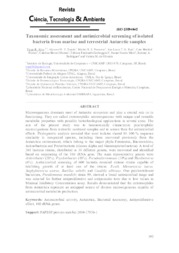Taxonomic assessment and antimicrobial screening of isolated bacteria from marine and terrestrial Antarctic samples.
Taxonomic assessment and antimicrobial screening of isolated bacteria from marine and terrestrial Antarctic samples.
Autoria: SILVA, T. R.; DUARTE, A. W. F.; PASSARINI, M. R. Z.; RUIZ, A. L. T. G.; FRANCO, C. H.; MORAES, C. B.; FANTINATTI-GARBOGGINI, F.; MELO, I. S. de; RODRIGUES, R. A.; OLIVEIRA, V. M.
Resumo: Microorganisms dominate most of Antarctic ecosystem and play a crucial role in its functioning. They are called extremophilic microorganisms with unique and versatile metabolic properties with possible biotechnological applications in several areas. The aim of the present study was to taxonomically characterize psychrophilic microorganisms from Antarctic continent samples and to screen them for antimicrobial effects. Phylogenetic analysis revealed that most isolates shared 98?100 % sequence similarity to recognized species, including those recovered previously from the Antarctica environment, which belong to the major phyla Firmicutes, Bacteroidetes, Actinobacteria and Proteobacteria (classes Alpha and Gammaproteobacteria). A total of 361 bacteria strains, distributed in 38 different genera, were recovered and identified based on sequencing of the 16S rRNA gene. The main representative genera were Arthrobacter (29%), Psychrobacter (19%), Pseudoalteromonas (10%) and Rhodococcus (4%). Antimicrobial screening of 600 bacteria revealed sixteen strains capable of inhibiting growth of at least one of the strains: E.coli, Micrococcus luteus, Staphylococcus aureus, Bacillus subtilis and Candida albicans. One psychrotolerant bacterium, Pseudomonas mandelii strain 99, showed a broad antimicrobial range and was selected for further antiproliferative and antiparasitic tests due to low values in Minimal Inhibitory Concentration assay. Results demonstrated that the extremophiles from Antarctica represent an untapped source of diverse microorganisms capable of antimicrobial metabolite production.
Ano de publicação: 2018
Tipo de publicação: Resumo em anais e proceedings
Unidade: Embrapa Meio Ambiente
Palavras-chave: 16S rRNA genes, Antarctica, Antimicrobial activity, Antiproliferative effect, Bacterial taxonomy
Observações
1 - Por padrão são exibidas publicações dos últimos 20 anos. Para encontrar publicações mais antigas, configure o filtro ano de publicação, colocando o ano a partir do qual você deseja encontrar publicações. O filtro está na coluna da esquerda na busca acima.
2 - Para ler algumas publicações da Embrapa (apenas as que estão em formato ePub), é necessário ter, no celular ou computador, um desses softwares gratuitos. Sistemas Android: Google Play Livros; IOS: iBooks; Windows e Linux: software Calibre.
Acesse outras publicações
Acesse a Base de Dados da Pesquisa Agropecuária (BDPA) para consultar o acervo completo das bibliotecas da Embrapa.

